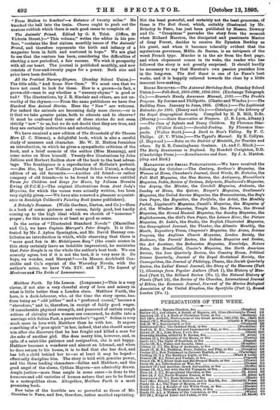Matthew Furth. By Ida Lemon. (Longmans.)—This is a very clever,
if not also a very cheerful story of love and misery in what is little better than a London slum. Matthew Furth, the hero, is a dock-labourer, who, at the time the story opens, has, from being an " odd jobber " and a " preferred casual," become a "stevedore," and is, therefore, in receipt of fairly good wages. :)f considerable physical strength, and possessed of certain rough totions of chivalry where women are concerned, he drifts into a narriage with Selina Pask, a pawnbroker's " agent." Selina is very such more in love with Matthew than he with her. It argues something of a "poor spirit" in her, indeed, that she should marry aim after she discovers that he has fought and killed a man for the sake of another girl. She does marry him, however, and, in spite of a saint-like patience and resignation, she is not happy. Matthew becomes a wanderer and almost an Ishmael, and when he does return to his house, it is to find that she has died, and has left a child behind her to—so at least it may be hoped— effectually discipline him. The story is told with genuine power, and the three leading characters—Selina and Matthew, and the good angel of the slums, Cythna Mayern—are admirably drawn. Ample justice—more than ample in some cases—is done to the humours and odd varieties of human nature that are to be found in a metropolitan alum. Altogether, Matthew Furth is a most promising book.
Few tales of the horrible are so powerful as those of Mr. Sheridan le Faun, and few, therefore, better merited reprinting. Not the least powerful, and certainly not the least gruesome, of these is The Brit Guest, which, suitably illustrated by Mr. Brinsley le Fanu, has just been published by Messrs. Downey and Co. "Creepiness" pervades the story from the moment when Richard Marston, the dissipated and passionate Master of Gray Forest, decides to receive Sir Dynston Berkley as his guest, and when it becomes tolerably evident that the mysterious governess, Mdlle. de Barras, is an intrigante of the worst French type. Murder is in the air from the first page, and when elopement comes in its wake, the reader who has followed the story is not greatly surprised. It should hardly be necessary to say that Marston's own passion punishes him in the long-run. The Evil Guest is one of Le Fanu's beat works, and it is happily relieved towards the close by a little innocent love-making.


















































 Previous page
Previous page